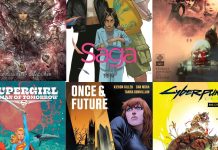
Best Graphic Story (785 nominating ballots)
- Ms. Marvel Volume 1: No Normal, written by G. Willow Wilson, illustrated by Adrian Alphona and Jake Wyatt, (Marvel Comics)
- Rat Queens Volume 1: Sass and Sorcery, written by Kurtis J. Weibe, art by Roc Upchurch (Image Comics)
- Saga Volume 3, written by Brian K. Vaughan, illustrated by Fiona Staples (Image Comics))
- Sex Criminals Volume 1: One Weird Trick, written by Matt Fraction, art by Chip Zdarsky (Image Comics)
- The Zombie Nation Book #2: Reduce Reuse Reanimate, Carter Reid (The Zombie Nation)
Best Dramatic Presentation, Long Form (1285 nominating ballots)
- Captain America: The Winter Soldier, screenplay by Christopher Markus & Stephen McFeely, concept and story by Ed Brubaker, directed by Anthony Russo and Joe Russo (Marvel Entertainment, Perception, Sony Pictures Imageworks)
- Edge of Tomorrow, screenplay by Christopher McQuarrie, Jez Butterworth, and John-Henry Butterworth, directed by Doug Liman (Village Roadshow, RatPac-Dune Entertainment, 3 Arts Entertainment; Viz Productions)
- Guardians of the Galaxy, written by James Gunn and Nicole Perlman, directed by James Gunn (Marvel Studios, Moving Picture Company)
- Interstellar, screenplay by Jonathan Nolan and Christopher Nolan, directed by Christopher Nolan (Paramount Pictures, Warner Bros. Pictures, Legendary Pictures, Lynda Obst Productions, Syncopy)
- The Lego Movie, written by Phil Lord & Christopher Miller, story by Dan Hageman, Kevin Hageman, Phil Lord & Christopher Miller, directed by Phil Lord & Christopher Miller (Warner Bros. Pictures, Village Roadshow Pictures, RatPac-Dune Entertainment, LEGO System A/S, Vertigo Entertainment, Lin Pictures, Warner Bros. Animation (as Warner Animation Group))
Best Dramatic Presentation, Short Form (938 nominating ballots)
- Doctor Who: “Listen”, written by Steven Moffat, directed by Douglas Mackinnon (BBC Television)
- The Flash: “Pilot”, teleplay by Andrew Kreisberg & Geoff Johns, story by Greg Berlanti, Andrew Kreisberg & Geoff Johns, directed by David Nutter (The CW) (Berlanti Productions, DC Entertainment, Warner Bros. Television)
- Game of Thrones: “The Mountain and the Viper”, written by David Benioff & D. B. Weiss, directed by Alex Graves ((HBO Entertainment in association with Bighead, Littlehead; Television 360; Startling Television and Generator Productions)
- Grimm: “Once We Were Gods”, written by Alan DiFiore, directed by Steven DePaul (NBC) (GK Productions, Hazy Mills Productions, Universal TV)
- Orphan Black: “By Means Which Have Never Yet Been Tried”, ” written by Graham Manson, directed by John Fawcett (Temple Street Productions, Space/BBC America)
Now… this is a bit of a popularity contest. Attendees (or sponsors, if you just want to support the show and vote) are the electorate. Usually, voting tallies around 3-4,000 ballots cast.
Voting on the final ballot will begin shortly after the finalists are announced. Only members of the 2015 Worldcon can vote on the final ballot. Both attending and supporting (non-attending) members of the 2015 Worldcon will be able to vote on the final ballot. You do not have to attend the 2015 Worldcon to vote on the 2015 Hugo Awards.
So… something interesting happened LAST year. A group of fans and professionals felt that the fans and awards had overlooked or dismissed certain creators, that some were pushing a quiet agenda, tainting the ideal of awarding the best in the field by using non-literary criteria to nominate creators. To make a point, working within the rules, they suggested a slate of nominees, one in each category. They were successful… they placed many of their recommendations on the final ballot.
People felt that this went against the spirit and tradition of the Hugo Awards, considered one of the most prestigious awards in science fiction. John Scalzi, former president of the Science Fiction and Fantasy Writers of America, and a Hugo winner, wrote a reasoned and tolerant reaction to all this last year.
This year, the same group, titled “Sad Puppies”, put forth a slate featuring multiple nominees. (Here’s a bare-bones analysis.) They were quite successful, and that’s when the Internet erupted. (They had one graphic novel candidate. Can you guess which one from the list above?) Many felt the system had been gamed, and that the integrity of Hugo Awards was in danger of being tarnished as naked campaigning would now become commonplace.
Breitbart has their reaction to the news (although they have a bigger agenda as well). Larry Correia, who created the Sad Puppies campaign, withdrew his title for consideration (as the rules allow):
The reason I refused my nomination is that as long as the guy who started Sad Puppies stayed in, the more our opposition would try to dismiss the whole campaign as being all about my ego, or some selfish personal desire to get award recognition. Nope. I really meant it when I said I don’t care about winning anything for myself. I hope this proves that once and for all.
There is one control in the voting (which is quite complex): each category has “no award” as a choice. Each voter can rank the finalists, and No Award can “win” just like any other nominee. Even after the end of counting, “No Award” can still win:
The No Award Test
The final check before a winner can be determined is known as the No Award Test. The valid ballots are divided into three piles: those in which No Award is ranked higher than the prospective winner, those in which the prospective winner is ranked higher than No Award, and those in which neither No Award nor the prospective winner have preferences listed. Note that a ballot that contains a preference for the prospective winner but does not contain a preference for No Award goes into the “prospective winner higher than no award” pile. This is because lack of preference is, by definition, lower than any preference. Having got the three piles, the votes in the “prospective winner higher than No Award pile” and the votes in the “No Award higher than prospective winner” pile are counted. If the number of votes with the prospective winner placed higher is greater then the result is confirmed. If the pile with No Award placed higher is greater then no award is given in the category that year.
Many voters have stated online that they are no-voting this year, in protest.
Why do we comics fans care? Because we have awards which are popularity contests, albeit limited to professionals. Some have very vague rules, and none have the strict advertising/campaigning rules seen at the Oscars. (If the Eisners are the Oscars, then the Harvey Awards are the Golden Globes.) (Do comics publishers send out review copies like the Oscars and Hugos do? It’s quite easy… Comixology could offer free downloads on specific nominees.)
Because, like other fandoms, we are passionate about what we enjoy, and that passion can fuel disagreements.
Because, fueling all this are the familiar keywords: gamergate, social justice warriors, diversity, fake fans, punishing a creator’s work because of a creator’s behavior/point of view. Graphic novels are just now achieving the level of popularity and respect that Science Fiction earned in the late 60s (which also saw a flood of new female fans thanks to Star Trek). As award medallions on covers and in author biographies spur sales for decades to come, how soon before a similar controversy once again taints a comics award?







Torsten, thank you for the only even-tempered, dispassionate account of the Hugo controversy I’ve read. All other stories about this that I’ve found are accompanied by a denouncement of one side or the other, or seem driven by a presumption that I’m just looking to be told who to hate.
Its actually a bit more than this. I’ve been vending sci fi conventions for two decades now. It goes a bit more like this (I’ll put this in comic terms since I read both comics and sci-fi/fantasy). With comics both marvel and dc will push titles. Both do this. Go to DC’s page and you will see adds for it. Go to Marvel and you will see adds for Marvel titles. Now if one side has historically pushed for their side and the other has not the wins would be lopsided in a fan vote where comic fans had to pay 40$ a year to vote or nominate a comic for an award. Scalzi has done this (example circa 2008 :http://whatever.scalzi.com/2008/01/03/the-2008-award-pimpage-post/ ) for himself. He has also plugged/pimped others. This is one example from his own blog. You also see it with writer guests of honor at cons. Corriea has now done the same thing. If one side can do it so can the other after all. The reasoning behind it from all of the stuff I have read (and note Corriea was nominated and pulled his nomination) is the “pressing of the flesh” has gotten to the point of utter silliness. So they did exactly the same thing in a very open manner to show exactly what goes on. Nothing more than Scalzi did on his blog in 2008. Its like that old saying about eating sausage. “If you are going to eat sausage then you should see how it is made and what goes into it”. I have read most of the Hugo awards final five and some are good and some not so good. Some havent really belonged in the final five in some years if you want my honest opinion. I have both Scalzi and Corriea on my bookshelf and as I have not paid my $40 worldcon supporter badge fee I cannot vote. I have no dog in this fight. That said Tor Books claimed the Locus Award for best publisher for 26 years in a row, and has won 38 of 156 Hugo nominations in the last 30 years. In 2014, when Tor.com was founded, it claimed 50 percent of short story nominations at the Hugos, 40 percent of novella nominations, and 20 percent of the novelette nominations. Honestly in the past 20 years or so (Mid 90’s) Tor hasnt had all that good a line up in my opinion and what has been good has mostly had some form of social justice message. I dont mean rape bad/honor good type of message either. I mean its almost a political message. Frankly I do not need political messages in my science fiction. I get enough of it in the news.Of course there are exceptions,but most of it seems to come off preachy. I have been steadily cutting back on Tor publications because of this. I would do the same with Marvel or DC if they consistently did the same across a majority of their comics. Now the other side is doing exactly the same thing in blogs and such to make it publicly known what goes on with this. Personally I feel it should be free (the $40/yr gets you the books of the final five in each category or so I am told) without the books. Let the fans choose and stop pressing the flesh and pimping your books and/or your friends,co-workers etcs books or do not complain when those you do not like do the same. The saddest part is if you go to one of the most vocal on one side (http://nielsenhayden.com/makinglight/archives/016177.html ) or you go to Larry Corrieas page on it (http://monsterhunternation.com/) you can see how it is being handled by each camp. Personally I like to read what I like to read andc I am certain you guys do too. Thing is when one side says if I do not agree with their politics/political standpoint I am not a real fan,that kind of irritates me. Much of this is actual US Liberal vs Conservative silliness spread over into the awards and fandom (admittedly however one side seems to be doing it more than the other). There are two news articles on it that I have found but they seem to be from the same guy. I’ll post them anyways here at the end. Thing is the new kids who are different than the kids already on the playground want to use it too and the kids already on the playground in many ways do not want to share. Thats what I have seen first hand at conventions by people in the past 5 to 10 years. First: http://www.breitbart.com/london/2015/04/04/hugo-awards-nominations-swept-by-anti-sjw-anti-authoritarian-authors/ Second: http://www.breitbart.com/london/2015/02/05/the-hugo-wars-how-sci-fis-most-prestigious-awards-became-a-political-battleground/
ALL awards are popularity contests.
Comments are closed.